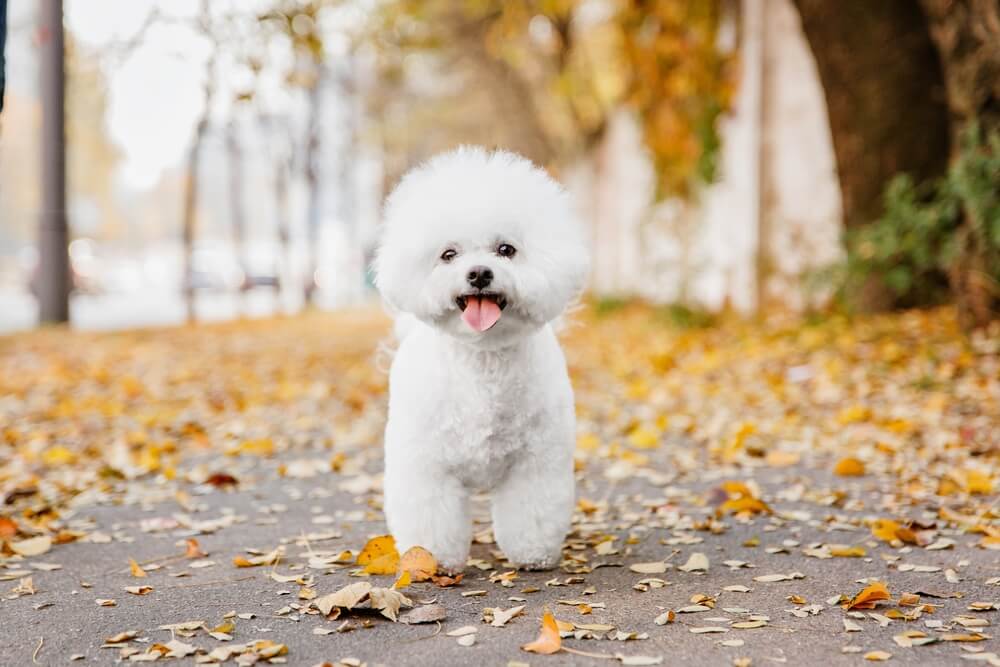Bichon Frise Dog Breed: Size, Personality and More

DogFoodAdvisor is reader supported See how
All reviews are 100% impartial but if you buy using links on this page, we may earn a referral fee.
The Bichon Frise has a long history that spans Europe and the Mediterranean and is part of a group of small white dogs known as Barbichon types, which includes the Bolognese, Havanese, Tenerife and Maltese. Barbichon was later shortened to Bichon, meaning “curly hair” in French.
It is believed this breed’s modern development began on the island of Tenerife, where the Bichon Tenerife – the primary ancestor of today’s Bichon Frise – was popular with the sailors of the island.
In the 13th century, the Bichon Frise was favored by European nobility. However, during the French Revolution, the demand for these pampered lapdogs declined, and many of them ended up on the streets. Despite their fall from grace, their undeniable cuteness allowed them to become trained by street entertainers, who taught them tricks to earn money.
Belgian and French enthusiasts worked to save the breed from extinction and in 1933 the Bichon Frise was recognized by the Société Centrale Canine and the Fédération Cynologique Internationale in 1959.
A French family introduced the Bichon to the United States in 1956, and the American Kennel Club recognized the breed in 1973. They are now ranked the 44th most popular breed in the U.S.
Bichons are the best family dogs; they are cheerful, intelligent, and relish being the center of attention. These energetic dogs love being part of the action and thrive in busy households.
General Characteristics:
- Origin: Mediterranean
- Size: Small
- Height: 9.5 to 11.5 inches
- Weight: 12 to 18 pounds
- Lifespan: 14 to 15 years
Appearance:
- Coat: A double coat that is soft, dense and curly.
- Colors: White or cream.
- Build: Small and compact.
Bichon Frise Temperament:
- Cheerful: They love to be loved and centre of attention.
- Gentle: A sweet bread that is great around children.
- Playful: Full of energy they are lively and love to play.
Training and Exercising:
- Training: They are intelligent and eager to please, but can become overconfident. Start training early, be consistent, and keep sessions engaging.
- Exercise: Daily exercise should last 30 minutes to one hour, including brisk walks and playtime, but avoid over-exertion in hot temperatures due to heat sensitivity.
Grooming:
- Shedding: The Bichon Frise sheds very little; instead, the hair gets caught in the undercoat, so brushing two or three times a week will prevent matting.
Interesting Facts:
- As Royal lap warmers, the Bichon can be found in art from the 16th century by European artists such as Francisco de Goya, August Renoir, Titian, and Sir Joshua Reynolds.
- As a breed that performs exceptionally well, they have earned the title of Best in Show twice.
- Bichon Frises are not known for barking.
- They usually stop growing at around 12 months old, but will continue to gain weight for a few more months.
- Their ears are floppy and covered with long, curly hair, giving them a charming and endearing appearance.
Bichon Frise Price:
The average cost of a Bichon Frise in the U.S. varies depending on the dog’s pedigree, the breeder’s reputation, location, and whether the dog is intended for show, breeding, or as a pet. Here’s a general guide:
Show Quality or Breeding Quality Bichon Frise:
Price Range: $1,200 and $3,500
If buying a Bichon Frise puppy or specific breeds of Bichon Frise, the price will be towards the more expensive end of the spectrum.
Rescue or Adoption:
Adoption Fee: Around $300 and $500
A Bichon Frise adopted from a rescue organization or shelter generally costs less. This fee often includes initial veterinary care and spaying/neutering.
The Best Food for Bichon Frise
Open Farm Senior Grain-Free Turkey & Chicken Recipe
This food is a great choice for Bichon Frises because it provides high-quality, lean protein to support muscle maintenance while being grain-free to help with potential food sensitivities. It also includes joint-supporting ingredients like glucosamine and chondroitin, as well as fiber and probiotics for healthy digestion.
For more choices: See our Best Food for Bichon Frise page.
Final word
The Dog Food Advisor does not accept money, gifts, samples or other incentives in exchange for special consideration in preparing our reviews.
However, we do receive a referral fee from online retailers (like Chewy or Amazon) and from sellers of perishable pet food when readers click over to their websites from ours. This helps cover the cost of operation of our free blog. Thanks for your support.
For more information, please visit our Disclaimer and Disclosure page.



